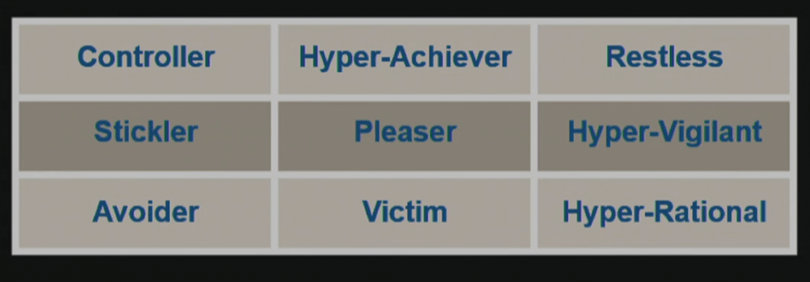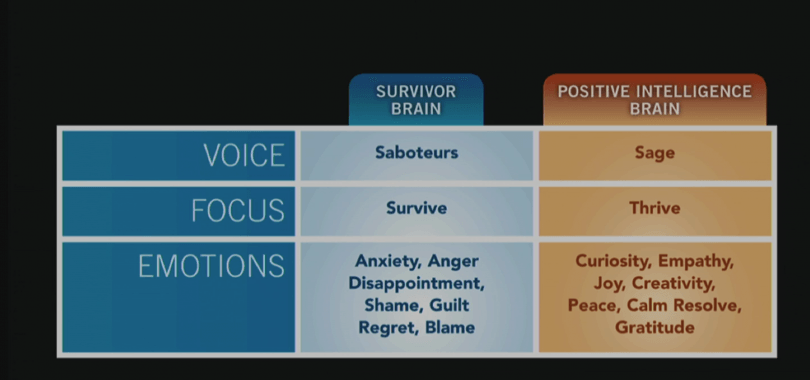Is your inner critic holding you hostage in a career you don’t love? All of us have an inner voice of self-doubt that whispers or shouts us down. But that doesn’t mean you have to allow your inner critic to control your life. You can tame your inner critic, put it back in its box and conquer your career and life!
What is an Inner Critic?
According to psychologist, Dr Margalis Fjelstad, your inner critic is a voice of self-doubt that forms during your early childhood. Fjelstad believes the inner critic is the voice of your parents. Parents who speak to their children with loving kindness cultivate a positive inner voice but parents who are overly critical can create a negative inner voice. A child feels when a parent is happy, angry, encouraging or critical and embeds this information as they figure out ‘who am I?”.
But Stanford University Professor, Shirzad Chamine, says even children who have a perfectly happy childhood develop up to nine inner critical voices, which he calls ‘saboteurs’. His research suggests everyone has their master judge saboteur and at least one additional saboteur.
The 9 Saboteurs
Source: Know Your Inner Saboteurs – Professor Shirzad Chamine
These saboteurs develop as coping mechanisms. For example, if you grow up in a chaotic environment you can develop a controlling voice to help you feel secure.
“They become the invisible saboteurs in your head who pretend they’re you but they’re not really you and that’s how you forget who you really are,” said Professor Chamine.
The same voice that judges you, judges’ others too.
In adulthood, the inner critic exerts a lot of energy trying to remember the things we shouldn’t do and leaves us feeling inferior and less deserving of happiness.
But there is a counter agent to the saboteur. This is the positive inner voice Professor Chamine calls the Sage. It is our true nature, the one we knew as a child, who believes we are capable, creative and wants us to thrive. The challenge is how do you silence the critic, so you can hear the sage?
Source: Source: Know Your Inner Saboteurs – Professor Shirzad Chamine
How Do I Conquer My Inner Critic?
In her TED Talk Your Inner Critic is a Big Jerk, artist Danielle Krysa tells a story of how she developed her inner critic.
As a child, she loved to paint. When she left school, she enrolled at art school and was asked by her professor to submit an artwork for critique. This was a big opportunity for Danielle get valuable feedback from experts so worked hard and submitted her best work.
For the next 45 minutes, Danielle’s classmates and Professor gave their unfiltered opinions and tore her artwork to shreds. At the end, her professor said, ‘you should never paint again’.
Danielle listened and for 15 years did not pick up a paint brush. Instead of pursuing her love of painting she went into advertising as a graphic designer, then artistic director.
Many years later, she questioned what happened to her love of painting? This sparked an idea to research and write a book about the role of the inner critic. As part of her research, she reached out to another artist and asked how she handled criticism.
“No one can wrestle the pencil out of your hand. You get to keep going in absolute defiance,” said the artist.
When Danielle heard this, she cried.
“More than 15 years after that experience in university, I realised it wasn’t my professor that stopped me. I did it. It was my responsibility to pick up my paint brush and do it the next day and the day after that. That was the day I decided my inner critic was no longer in charge,” said Danielle.
There are three steps you can take to conquer your inner critic.
1. Know Thy Enemy
In order to conquer your inner critic, you must identify it.
Pay attention to the voice that pops up when you face a daunting challenge. What is your inner critic trying to tell you? Which of the nine saboteurs is holding you in a fixed mindset, believing that you’re doomed to fail?
Be aware there is often an obvious loud inner critic (your judge) also quiet whispers (the nine saboteurs) that are harder to hear who undermine your confidence.
2. Talk to Your Enemy
Recognise that you have a choice. You can listen and accept what your inner critic tells you or you can challenge it.
“You weaken your saboteurs by exposing and labelling them,” Professor Chamine.
One exercise you can do is to write down your self-criticism and instead of “I” statements, re-write them as “you” statements. So, instead of writing “I won’t get that job, I’m good enough,” write ‘You won’t get that job, you’re not good enough.” Would you ever say such a thing to others? Probably not.
Use this exercise to re-assess whether these statements are true. Then speak back to your inner critic in a growth mindset (you can do this in a diary or somewhere private, it doesn’t mean muttering to yourself on public transport!).
Danielle Krysa suggests giving your inner critic a name, something cute and non-threatening to help you make peace with it.
“Hello Frank, is that you calling me a failure again? It is possible I may fail but actually, lots of very successful people have failed and learned from the experience. I’m going to try my best and learn from the experience.”
Use this exercise to cultivate a kinder, more compassionate attitude towards yourself, as you would treat others.
3. Listen to Your Sage
Even successful people have an inner critic, but the trick is to know when to listen to it and when to tune out.
Every outcome or circumstance can be turned into opportunity, even those you might consider failures. In my blog What Mindset Are You? I talk about how to cultivate a growth mindset. That is, when you don’t succeed at first, rather than label yourself a failure, think “I’m not there yet but I’m learning”.
To silence their inner critic, I encourage my clients to be present in the moment because the inner critic is focused on future consequences. Often those consequences aren’t my client’s fault. For example, they might nail a job interview, but the panel decides that the other candidate is a better fit. They can’t control the outcome, so it doesn’t make sense for them to criticise their own best effort.
Another way to turn down the volume on your inner critic is to practice mindfulness. Professor Chamine says just 10 seconds of mindfulness several times a day can dramatically increase your potential to listen to and respond to your sage. It might be feeling your loved-one’s heartbeat as you give them a hug or feeling the sun on your back as you walk. Tuning into the small details strengthens your brain so you can hear your authentic voice.
You can also practice mindfulness by taking time to acknowledge your good work. One of my clients tends to pass over success so quickly she doesn’t experience the joy of it. I am constantly reminding her acknowledge her achievement and breathe in that feeling for a moment. This helps counter the inner voice because it is challenged by a success story.
Try to feel compassion for yourself and others. Know that you would never speak to others the way you speak to yourself and ask yourself why you’re being judgmental. Recognise your value is not determined by your career success or failures – you’re worthy just for being you. This will keep you energised and positive.
Don’t be held hostage by your inner critic. Take on the challenge. Be willing to learn from mistakes and listen to your sage who knows your worth and potential.
Are you ready to tame your inner critic and conquer your career? Book a career breakthrough conversation with me today.
To find out more on how to tame your critic:
Watch
Read









